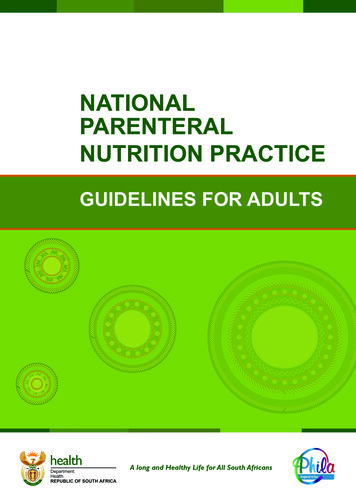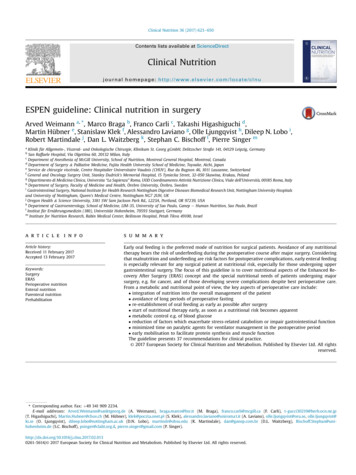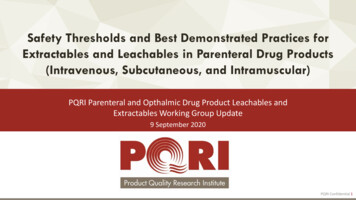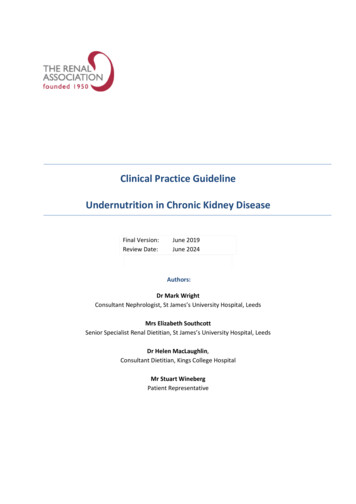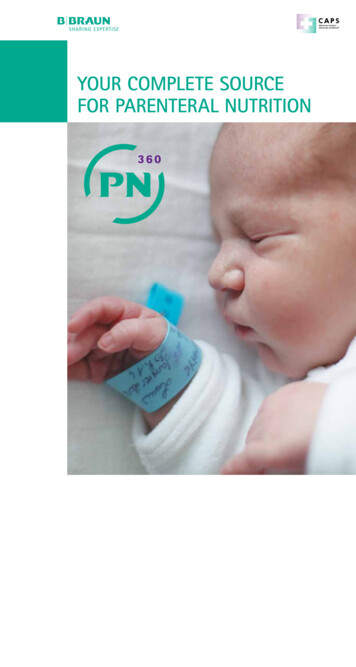
Transcription
YOUR COMPLETE SOURCEFOR PARENTERAL NUTRITION
A COLLABORATION THATGOES BEYOND THE PRODUCTS.With the establishment of the Hospital Readmissions ReductionProgram*, parenteral nutrition has never been more critical toimproving patient outcomes. B. Braun and Central AdmixturePharmacy Services, Inc. (CAPS ) are focused on improving patientoutcomes with PN360.PN360 is more than solutions and technology. Backed by decadesof expertise in clinical nutrition, it’s your single-source providerfor parenteral nutrition education, training, products, and servicespaired with an ongoing collaboration with your facility’s nutritionalsupport team.*Section 3025 of the Affordable Care Act added section 1886(q) to the Social Security Act establishingthe Hospital Readmissions Reduction Program, which requires CMS to reduce payments to IPPS hospitalswith excess readmissions, effective for discharges beginning on October 1, 2012.
LET’S WORK TOGETHER.We can provide the knowledge and support needed forthe safe and effective use of parenteral nutrition, including: Order entry software Compounding Nutrition solutions and products Services and supportFOR THE BETTER.For you, your patients, and the entire health care system.Parenteral nutrition helps ensure that your most critical patientsaren’t negatively affected by malnutrition, both in the hospitaland at home.Malnutrition has been associated with an increased lengthof hospital stay, increased morbidity and mortality, impairedrespiratory and cardiac function, decreased immune function, andpoor growth in infants and children.1PN360 is designed to: Minimize patient health complications Decrease readmission rates Lower infection rates Reduce resource utilization1Soliah, LuAnn, PhD, RD. Today’s Dietitian, Vol.10 No7, 2008
THE MOST COMPREHENSIVE SOLUTIONFOR PARENTERAL NUTRITION.Our support starts with an assessment of your facility’s needs and continuesthrough education, training, and expert parenteral nutrition consulting.Whether your facility prefers to compound in-house, outsource, or a combinationof both, you’ll be covered by our line of products and services, working togetherwith a focus on preventing malnutrition and prescribing the right dose at theright time for the best patient outcomes.NGACCURATECOMPOUNDINGIN-HOUSE:APEX COMPOUNDINGSYSTEMPINNACLE TPNMANAGEMENTSYSTEM OUTSOURCING:CAPS ADDEDSAFETYIN-HOUSE:TPN ManagerOUTSOURCING:CAPSLink TRUSTEDNUTRITIONPN SolutionsRTOSUPPVA L U EEDUCATIONTINIRA
AININGVA L U EEDUCATIONTRRTOPSUPTo learn more, contact your B. Braun Sales Representative,or call Customer Service at 1-800-227-2862.B. Braun Medical Inc. Bethlehem, PA1-800-227-2862 BBraunUSA.comRx only. 2017 B. Braun Medical Inc., Bethlehem, PA. All rights reserved.Rx only. 2017 CAPS (Central Admixture Pharmacy Services, Inc.), Irvine, CA. All rights reserved.MC04 02/17
TPNPYAN INTEGRATED, AUTOMATED SYSTEM FORSAFE AND EFFICIENT PARENTERAL NUTRITIONRAITH HEW TW TENO PLEMCOIN-HOUSE COMPOUNDING
INNOVATION FROM SETUP TO DELIVERYAN IN-HOUSE COMPOUNDING SYSTEM FOR YOUR MOST CRITICAL NEEDSPN360 offers fully integrated systems of software andtechnology to streamline the ordering, compounding, anddelivery of parenteral nutrition within your facility. Our APEX and PINNACLE compounding devices deliver accuracy andefficiency while our TPN Manager Software brings the entiresystem online with automation across the board.APEX COMPOUNDING SYSTEMAPEX offers the latest in compounding technology, buildingonto the benefits of PINNACLE while delivering both macroand micro compounding with one machine. It‘s a comprehensivesolution designed with your most critical patients and yourmost critical needs in mind:Large user interface designed to increase legibility and enableeasy activation of touch screen buttonsDual-drive filling technology for precise automated deliveryof macro and micro ingredients, as low as 0.2mL26-lead, preassembled, numbered, and barcoded transferset is designed to eliminate the possibility of transposingsolution lines and reduce the risk of touch contamination······PINNACLE TPN MANAGEMENT SYSTEMPINNACLE offers advanced automation designed for fast,smart, and user-friendly macro compounding:Designed to reduce setup and TPN preparation timeHelps promote safety and compliance with automatic,real-time checksSimplifies compounding process with a Windows -baseduser format······TPN MANAGER CLINICAL DECISION SUPPORT SOFTWARETPN Manager is the connective tissue of PN360’s in-housesystem. It’s a browser-based software that allows you to bringAPEX and PINNACLE online to optimize and integrate all aspectsof in-house TPN compounding:Streamlines the ordering processAutomates complex calculations for accuracyDelivers protection with Trissel’s Ca/P Check Safety Software······TPN COMPLETE THERAPYB. Braun and Omnicell have teamed up to help reduceworkflow redundancies. We’re integrating B. Braun‘s APEXand Omnicell‘s I.V. SOFT semi-automated IV compoundingtechnology to streamline the TPN compounding process,provide checks and documentation, and support remotepharmacist verification.PN360 is committed to helping your facility deliversafe and accurate parenteral nutrition for the bestpatient care. To learn more, contact your B. BraunSales Representative, or call Customer Service at1-800-227-2862.Rx only. 2017 B. Braun Medical Inc., Bethlehem, PA. All rights reserved.Rx only. 2017 CAPS (Central Admixture Pharmacy Services, Inc.), Irvine, CA. All rights reserved.MC09 02/17
PARENTERAL NUTRITION SOLUTIONSTRUSTED PARENTERAL NUTRITION SOLUTIONSFOR INDIVIDUAL PATIENT NEEDS
DELIVERING QUALITY AND CONFIDENCEPARENTERAL NUTRITION FOR BOTH BASIC AND SPECIALTY NUTRITIONB. Braun has a legacy of developing unique formulationsto enhance care and improve patient outcomes. Thiscommitment to the continued development of new productshas led to a valued and trusted line of parenteral nutritionsolutions.As one of the leading providers of neonatal and pediatricparenteral nutrition solutions, we make sure that every solutionwe deliver has been thoroughly tested to ensure top-levelsafety. So, whether you’re looking to outsource or compoundin-house, you can trust our parenteral nutrition solutions asthe building blocks for critical, high-quality nutrition.THE FULL PARENTERAL NUTRITION SOLUTIONS LINEAmino Acid SolutionsPlenamine (15% Amino Acid Injection)FreAmine (10% Amino Acid Injection)NephrAmine (5.4% Amino Acid Injection)TrophAmine (6% Amino Acid Injection)TrophAmine (10% Amino Acid Injection)FreAmine HBC (6.9% Amino Acid Injection)HepatAmine (8% Amino Acid Injection)··············Pre-mixed Peripheral Parenteral NutritionProcalAmine (3% Amino Acid & 3% GlycerinInjection with Electrolytes)··Intravenous Fat EmulsionsNutrilipid (20% IV Fat Emulsion)*250mL / 500mL / 1000mL··ElectrolytesConcentrated Potassium Chloride Injection USP (KCL)Hyperlyte CR Multi-Electrolyte Concentrate····Dextrose Injections70% Dextrose Injection USP 2000mL bag··Sterile Water InjectionsSterile Water for Injection USP 2000mL / 3000mL bag··PRODUCT SHOT 2Available Pharmacy Bulk Packs:Plenamine (15% Amino Acid Injection)Nutrilipid (20% IV Fat Emulsion)* 1000mL70% Dextrose Injection USP 2000mL bagSterile Water for Injection USP 2000mL / 3000mL bagFreAmine (10% Amino Acid Injection)··········PN360 is committed to developing and deliveringhigh-quality solutions so your facility can continueproviding the best possible patient care. To learnmore, contact your B. Braun Sales Representative,or call Customer Service at 1-800-227-2862.* Please see prescribing information included in this packet.Flexible containers not made with natural rubber latex, PVC, or DEHP.Rx only. 2017 B. Braun Medical Inc., Bethlehem, PA. All rights reserved.Rx only. 2017 CAPS (Central Admixture Pharmacy Services, Inc.), Irvine, CA. All rights reserved.MC10 02/17
Brief Summary (for full Prescribing Information and Patient Information, refer to Package Insert)Nutrilipid I.V. Fat Emulsion - soybean oil injection, solution WARNING: DEATH IN PRETERM INFANTSDeaths in preterm infants after infusion of intravenous lipid emulsions have been reported inthe medical literature.Autopsy findings included intravascular fat accumulation in the lungs.Preterm infants and low birth weight infants have poor clearance of intravenous lipidemulsion and increased free fatty acid plasma levels following lipid emulsion infusion.phytosterols (plant sterols) contained in plant-derived lipid formulations have been associated withdevelopment of PNALD although a causal relationship has not been clearly established.If Nutrilipid 20% treated patients develop liver test abnormalities consider discontinuation or dosereduction.INDICATIONS AND USAGENutrilipid 20% is indicated as a source of calories and essential fatty acids for parenteral nutrition andas a source of essential fatty acids when a deficiency occurs when oral or enteral nutrition is not possible,insufficient, or contraindicated.HypertriglyceridemiaTo evaluate the patient’s capacity to eliminate and metabolize the infused lipid emulsion, measureserum triglycerides before the start of infusion (baseline value), with each increase in dosage, and regularlythroughout treatment.Reduce dose of Nutrilipid 20% and monitor serum triglyceride levels in patients with serum triglycerideconcentrations above 400 mg/dL to avoid the clinical consequences associated with hypertriglyceridemia.Serum triglyceride levels above 1000 mg/dL have been associated with an increased risk of pancreatitis.Impaired lipid metabolism with hypertriglyceridemia may occur in conditions such as inherited lipiddisorders, obesity, diabetes mellitus, and metabolic syndrome. In these cases, increased triglycerides canalso be increased by glucose and/or overfeeding. Monitor overall energy intake and other sources of fat andglucose, as well as drugs that may interfere with lipid and glucose metabolism.CONTRAINDICATIONSNutrilipid 20% is contraindicated in patients who have: Known hypersensitivity to egg or soybean proteins or to any of the ingredients, including excipients, or Severe hyperlipidemia (serum triglyceride concentrations above 1000 mg/dL) or severe disorders of lipidmetabolism characterized by hypertriglyceridemia.ADVERSE REACTIONS Death in Preterm Infants Hypersensitivity Reactions Infections Fat Overload SyndromeWARNINGS AND PRECAUTIONSDeath in Preterm InfantsDeaths in preterm infants after infusion of intravenous lipid emulsions have been reported. Autopsyfindings included intravascular lipid accumulation in the lungs.Base the decision to treat preterm and small for gestational age infants with intravenous lipid emulsionupon careful benefit-risk assessment. Strictly adhere to the recommended total daily dose; hourly infusion rateshould be as slow as possible and should not exceed 0.75 mL/kg/hour.Preterm and small for gestational age infants have poor clearance of intravenous lipid emulsion andincreased free fatty acid plasma levels following lipid emulsion infusion; therefore, seriously consideradministration of less than the maximum recommended doses in these patients in order to decrease thelikelihood of intravenous fat overload.Carefully monitor the infant’s ability to eliminate the infused lipids from the circulation (such as serumtriglycerides and/or plasma free fatty acid levels).Because of the risk of thrombocytopenia, monitor platelet counts frequently in neonatal patients receivingparenteral nutrition with Nutrilipid 20%.Clinical Trials ExperienceBecause clinical trials are conducted under widely varying conditions, adverse reaction rates observed inthe clinical trials of a drug cannot be directly compared to rates in the clinical trials of another drug and maynot reflect the rates observed in practice.Adverse reactions reported with other intravenous lipid emulsions include hyperlipidemia,hypercoagulability, thrombophlebitis, and thrombocytopenia.Adverse reactions reported in long-term use with other intravenous lipid emulsions include hepatomegaly,jaundice due to central lobular cholestasis, splenomegaly, thrombocytopenia, leukopenia, abnormalities in liverfunction tests, brown pigmentation of the liver and overloading syndrome (focal seizures, fever, leukocytosis,hepatomegaly, splenomegaly and shock). Hypersensitivity ReactionsStop infusion immediately and treat patient accordingly if signs or symptoms of a hypersensitivity orallergic reaction develop. Signs or symptoms may include: tachypnea, dyspnea, hypoxia, bronchospasm,tachycardia, hypotension, cyanosis, vomiting, nausea, headache, sweating, dizziness, altered mentation,flushing, rash, urticaria, erythema, pyrexia, and chills.InfectionsPatients who require parenteral nutrition are at high risk of infections due to malnutrition and theirunderlying disease state.Infection and sepsis may occur as a result of the use of intravenous catheters to administer parenteralnutrition, poor maintenance of catheters, or immunosuppressive effects of illness, drugs, and parenteralformulations.Decrease the risk of septic complications with heightened emphasis on aseptic technique in catheterplacement and maintenance, as well as aseptic technique in the preparation of the nutritional formula.Carefully monitor for signs and symptoms (including fever and chills) of early infections, includinglaboratory test results (including leukocytosis and hyperglycemia) and frequent checks of the parenteral accessdevice.Fat Overload SyndromeFat overload syndrome is a rare condition that has been reported with intravenous lipid formulations. Areduced or limited ability to metabolize the lipids contained in Nutrilipid 20% accompanied by prolongedplasma clearance may result in a syndrome characterized by a sudden deterioration in the patient’s conditionaccompanied by fever, anemia, leukopenia, thrombocytopenia, coagulation disorders, hyperlipidemia, liverfatty infiltration (hepatomegaly), deteriorating liver function, and central nervous system manifestations (e.g.,coma). The cause of the fat overload syndrome is unclear. The syndrome is usually reversible when the infusionof the lipid emulsion is stopped. Although it has been most frequently observed when the recommended lipiddose was exceeded, cases have also been described where the lipid formulation was administered according toinstructions.Refeeding SyndromeRefeeding severely undernourished patients with parenteral nutrition may result in the refeeding syndrome,characterized by the intracellular shift of potassium, phosphorus, and magnesium as the patient becomesanabolic. Thiamine deficiency and fluid retention may also develop. Carefully monitor severely undernourishedpatients and slowly increase their nutrient intakes, while avoiding overfeeding, to prevent these complications.Monitoring / Laboratory TestsMonitor fluid status closely in patients with pulmonary edema or heart failure.Monitor serum triglycerides, fluid and electrolyte status, serum osmolarity, blood glucose, liver and kidneyfunction, blood count (including platelets), and coagulation parameters throughout treatment.Interference with Laboratory TestsContent of Vitamin K may counteract anticoagulant activity.The lipids contained in this emulsion may interfere with the results of certain laboratory tests if the bloodsample is taken before the lipids are eliminated from the serum (these are generally eliminated after a periodof 5 to 6 hours without receiving lipids).Aluminum ToxicityNutrilipid 20% contains no more than 25 mcg/L of aluminum.The aluminum contained in Nutrilipid 20% may reach toxic levels with prolonged administration inpatients with impaired kidney function. Preterm infants are at greater risk because their kidneys are immature,and they require large amounts of calcium and phosphate solutions that contain aluminum.Patients with impaired kidney function, including preterm infants, who receive parenteral levels ofaluminum at greater than 4 to 5 mcg/kg/day, accumulate aluminum at levels associated with central nervoussystem and bone toxicity. Tissue loading may occur at even lower rates of administration of total parenteralnutrition products.Risk of Parenteral Nutrition Associated Liver DiseaseParenteral Nutrition Associated Liver Disease (PNALD) has been reported in patients who receiveparenteral nutrition for extended periods of time, especially preterm infants, and can present as cholestasisor steatohepatitis. The exact etiology is unknown and is likely multifactorial. Intravenously administered Refeeding SyndromeAluminum ToxicityRisk of Parenteral Nutrition Associated Liver DiseaseHypertriglyceridemiaDRUG INTERACTIONSCoumarin and Coumarin DerivativesThe soybean oil present in Nutrilipid 20% has vitamin K1. Vitamin K can reverse the anticoagulantactivity of coumarin and coumarin derivatives, including warfarin, which work by blocking recycling of vitaminK. Monitor laboratory parameters for anticoagulant activity in patients who are on both Nutrilipid 20% andcoumarin or coumarin derivatives.USE IN SPECIFIC POPULATIONSPregnancyPregnancy Category CRisk SummaryThere are no adequate or well controlled studies with Nutrilipid 20% in pregnant women. Additionally,animal reproduction studies have not been conducted with Nutrilipid 20%. It is not known whetherNutrilipid 20% can cause fetal harm when administered to a pregnant woman. Nutrilipid 20% should begiven to a pregnant woman only if clearly needed.Nursing MothersIt is not known whether Nutrilipid 20% is present in human milk. Because many drugs are present inhuman milk, caution should be exercised when Nutrilipid 20% is administered to a nursing woman.Pediatric UseThe evidence for safety and efficacy in pediatric patients of Nutrilipid 20% as a source of calories andessential fatty acids for parenteral nutrition and as a source of essential fatty acids when a deficiency occurswhen oral or enteral nutrition is not possible, insufficient, or contraindicated is derived from the publishedliterature and clinical experience with similar soybean oil based intravenous lipid emulsions.Deaths in preterm infants after infusion of intravenous lipid emulsion have been reported. Patients,particularly preterm infants, are at risk for aluminum toxicity. Patients, including pediatric patients, maybe at risk for PNALD. In clinical trials of a pure soybean oil based intravenous lipid emulsion product,thrombocytopenia in neonates occurred (less than 1%).Geriatric UseClinical studies of Nutrilipid 20% did not include sufficient numbers of subjects aged 65 and over todetermine whether they respond differently from younger subjects. Other reported clinical experience has notidentified differences in responses between the elderly and younger patients. In general, dose selection for anelderly patient should be cautious, usually starting at the low end of the dosing range, reflecting the greaterfrequency of decreased hepatic, renal, or cardiac function, and of concomitant disease or other drug therapy.Hepatic ImpairmentParenteral nutrition should be used with caution in patients with hepatic impairment. Hepatobiliarydisorders are known to develop in some patients without preexisting liver disease who receive parenteralnutrition, including cholestasis, hepatic steatosis, fibrosis and cirrhosis (parenteral nutrition associated liverdisease), possibly leading to hepatic failure. Cholecystitis and cholelithiasis have also been observed. Theetiology of these disorders is thought to be multifactorial and may differ between patients.Monitor liver function parameters closely. Patients developing signs of hepatobiliary disorders should beassessed early by a clinician knowledgeable in liver diseases in order to identify causative and contributoryfactors, and possible therapeutic and prophylactic interventions.OVERDOSAGEIn the event of overdose, fat overload syndrome may result. Stop the infusion to allow lipids to clear fromserum. The effects are usually reversible after the lipid infusion is stopped. If medically appropriate, furtherintervention may be indicated. The lipid administered and fatty acids produced are not dialyzable.DESCRIPTIONNutrilipid 20% is a sterile, nonpyrogenic fat emulsion prepared for intravenous administration.Each 100 mL of Nutrilipid 20% contains: Soybean Oil 20 g; Egg Yolk Phospholipid 1.2 g; Glycerin USP(glycerol) 2.5 g; Sodium Oleate 0.03 g; Water for Injection USP qs.LD-555-1REV. 1/2017
OUTSOURCED COMPOUNDINGTHE HIGHEST QUALITY PARENTERAL NUTRITION SOLUTIONSDELIVERED RIGHT TO YOU BY CAPS
CAPS OUTSOURCINGDELIVERING MORE THAN JUST CUSTOMIZED SOLUTIONSPN360’s outsourcing program is administered by CentralAdmixture Pharmacy Services, Inc. (CAPS ) and delivers safety,confidence, and the highest quality parenteral nutritionsolutions. CAPS is a market leader in the outsourcing ofcustomized parenteral nutrition, so your patients and yourfacility can rely on consistent, on-time deliveries of accurateand safe solutions.PRODUCT SHOT 1THE HIGHEST QUALITY OF COMPOUNDINGCAPS not only follows regulations, we help create them.For years, CAPS has been a leader for safe compoundingin 503A and 503B facilities. Today, we remain at the forefrontof complying with and implementing new quality control:Meeting industry standards in safety and qualityassurance reportingProven track record of delivering customized solutions formore than 25 years100% cGMP release testing for products compoundedin our 503B facilities······OPTIMIZED ORDERINGCAPSLink Software is designed to make parenteral nutritionorder entry secure, safe, and convenient while assuring accuracythroughout the compounding process:Online software allows ordering from anywhere in yourfacility where Internet access is availableBuilt-in safety checks throughout, including an additionalcheck by a CAPS pharmacistSame day delivery of custom-compounded parenteral nutritionInterface capability with your CPOE vendor designed forimproved pharmacy efficiency········YOUR PARTNER IN PARENTERAL NUTRITIONThrough CAPS ConsultingSM, our experts will work with your facilityto help train your team, optimize efficiency, and navigate theevolving regulatory environment:Customized staff education and training in parenteral nutritionand complianceExpertise in USP 797 , USP 800 , the Drug Quality andSecurity Act, and moreOn-site analysis with ReadyCheck SM Quality Assurance Program······PN360 outsourcing delivers the highest qualityof parenteral nutrition solutions so your facilitycan continue delivering the best patient care. To learnmore, contact your B. Braun Sales Representative,or call Customer Service at 1-800-227-2862.Rx only. 2017 B. Braun Medical Inc., Bethlehem, PA. All rights reserved.Rx only. 2017 CAPS (Central Admixture Pharmacy Services, Inc.), Irvine, CA. All rights reserved.MC11 02/17
PINNACLE TPN MANAGEMENT SYSTEM PINNACLE offers advanced automation designed for fast, smart, and user-friendly macro compounding: · Designed to reduce setup and TPN preparation time · Helps promote safety and compliance with automatic, real-time checks · Simplifies compounding process with a Windows -based user format

